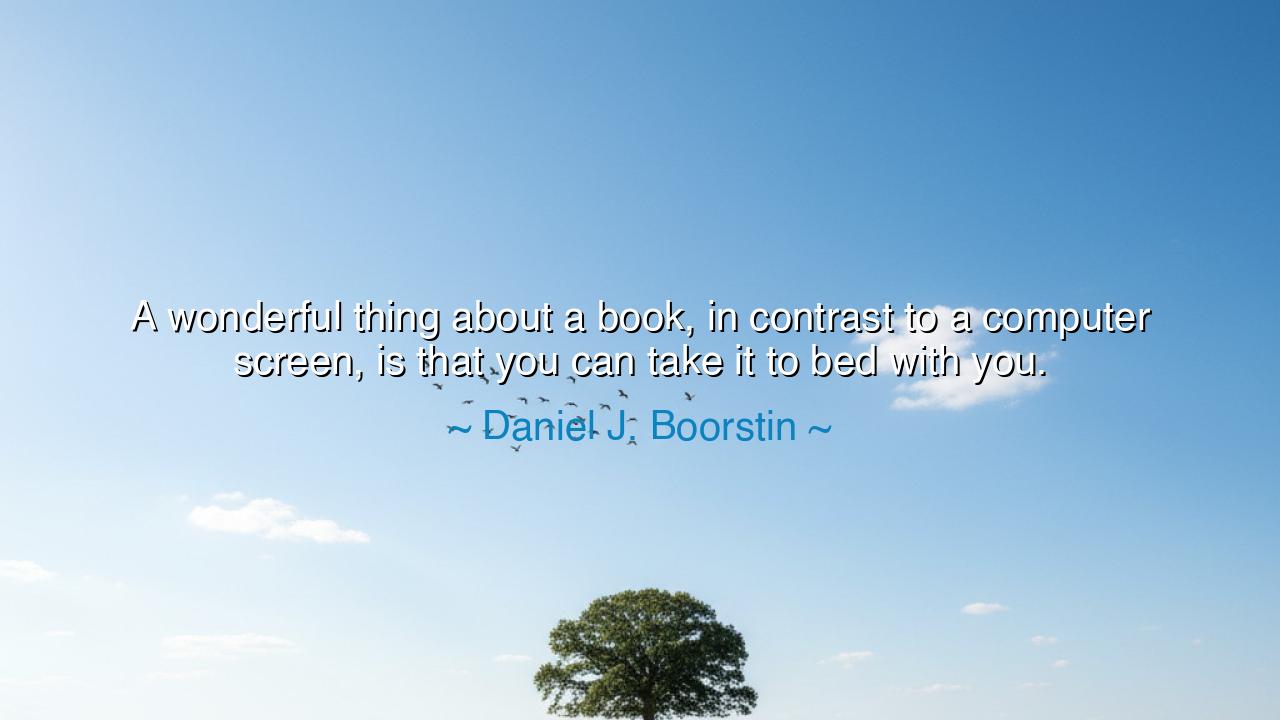
A wonderful thing about a book, in contrast to a computer screen
A wonderful thing about a book, in contrast to a computer screen, is that you can take it to bed with you.






In the ancient days, when the great philosophers and scribes of civilizations sought to capture the wisdom of their time, they did so through the written word. The scrolls, the tablets, the papyrus—these were the vessels of knowledge, and to hold one was to grasp a piece of the world's truth. A book was not merely a physical object, but a sacred gateway to the world of ideas, emotions, and human experience. The ancient Greeks believed that the written word was an immortalization of thought—a thought that, once recorded, could transcend time and space, carrying wisdom from the past into the future. Daniel J. Boorstin, a modern thinker, evokes this ancient connection when he says, "A wonderful thing about a book, in contrast to a computer screen, is that you can take it to bed with you."
Boorstin’s words speak to a timeless truth—that a book holds a unique place in the human experience. The book, unlike the computer screen, offers a personal connection that is difficult to replicate in the digital world. A book is not just a tool of learning, but a companion, a comfort, and a source of solace. To hold a book is to enter into a relationship with its contents, where the page and the mind become one. The ancient writers and philosophers, such as Socrates and Plato, understood that the written word was a means to connect not just with knowledge, but with the very essence of humanity. A book was an intimate object, one that could be held close, its wisdom nurtured by the mind, its words internalized by the soul.
In the modern age, technology—especially the computer screen—has come to dominate our lives. The digital world has opened new doors to information, entertainment, and connection. Yet, as Boorstin observes, this new tool lacks the tangible intimacy that a book offers. A screen, with its bright glare and its constant presence of digital noise, does not invite the quiet reflection that a book does. When we read a book, we enter into a space of contemplation, where the words unfold in a rhythm that matches the pace of the mind. The book becomes a sanctuary, one that we can retreat to at the end of the day, holding it in our hands as we close out the world. The screen, by contrast, is often an extension of the world’s distractions, a place where our attention is fractured and fragmented.
Consider the ancient scribes of Egypt, whose work was sacred. They inscribed upon stone and papyrus the thoughts of kings and gods, their tools of writing becoming a bridge between the mortal and the divine. The act of writing, of creating a book, was not just an intellectual endeavor; it was a deeply spiritual one. The book was a record of human wisdom and understanding, a medium through which the very essence of culture, law, and identity could be passed down. The book—whether a sacred text or a work of literature—became a part of the reader’s life, carried from place to place, studied, re-read, and absorbed. It was, in its essence, a personal journey that could be experienced again and again, much like a quiet companion in one’s travels.
In today’s world, the computer screen has become the modern tool of knowledge, offering immediate access to the vast oceans of human information. And yet, as Boorstin suggests, the book is something more than just a tool for gaining knowledge. It is a trusted companion—one that invites you into a personal experience, into a world where you are not just a consumer of information, but an active participant in a journey. A book, unlike the screen, does not demand your immediate attention or pull you away from the present moment. It does not constantly ask you to click, scroll, or refresh. It simply waits, offering its wisdom when you are ready, in a quiet, reflective space.
The lesson Boorstin offers is one of balance and mindfulness. In an age where the digital world often demands our attention, we must remember the importance of the tangible and the personal. The book, with its weight in our hands and its words unfolding at a pace we can control, offers something that the screen cannot: it offers a deep connection to the present moment and the wisdom of the past. Just as the ancients knew that wisdom had to be nurtured and preserved, so too must we approach our modern tools with intention.
Thus, the practical action we must take is to embrace books alongside our digital tools. Let us remember the unique joy and peace that comes from holding a book, from immersing ourselves in a world that is not governed by the fast-moving currents of digital technology. Let us read with mindfulness, allowing the words to unfold slowly, and let us carry these books with us—not just in our homes, but into the quiet places of our lives, as companions that offer wisdom, solace, and connection to the deeper truths of our human journey. In doing so, we will remember the ancient wisdom of those who understood that knowledge is not just found in the information we gather, but in the way we engage with the world around us.






AAdministratorAdministrator
Welcome, honored guests. Please leave a comment, we will respond soon